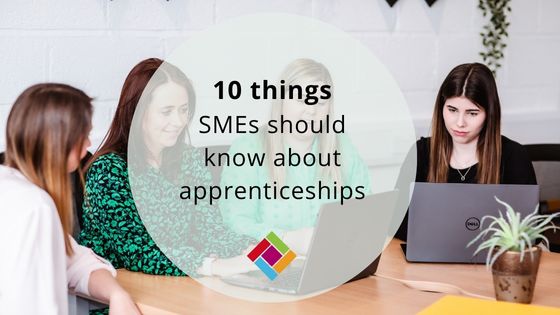
Do you want to bust some of the myths surrounding apprenticeships when it comes to SMEs? Here are the 10 things SMEs should know about apprenticeships.
1. Apprenticeships are not just for big businesses
Traditionally reserved for big businesses with big budgets, apprenticeships now come in all shapes and sizes – making them viable options for SMEs. Research from the National Apprenticeship Service shows that:
- More than 24,000 apprentice-employing SMEs in the private sector reported that hiring an apprentice helped them win business.
- 3 in 4 SMEs employing apprentices reported an increase in productivity.
- 96% of SMEs reported at least one business benefit to hiring an apprentice.
2. Funding is available for apprenticeships
If you employ fewer than 50 employees, the government will pay 100% of the apprenticeship training costs up to the funding band maximum for apprentices aged:
- 16 to 18
- 19 to 24 with an education, health and care plan provided by their local authority or has been in the care of their local authority
3. You can create your apprenticeship scheme to suit your business
The Government now allows firms to design their schemes with bolt-ons to suit their own business needs. Before you embark on a pilot scheme, you will need to choose the relevant apprenticeship framework or standard and determine the level of apprenticeship that meets your business needs. You can see the different apprentice standards here..
4. The number of apprentices completing advanced programmes is rising
Despite the dismal stats released in the past on the take-up of apprenticeship places, the number of apprentices advanced or higher programmes has risen. Advanced schemes are equivalent to two A-level passes, higher levels are equivalent to foundation degree level and above.
5. Apprenticeships vary in length but must be for at least one year
Many can last as long as five years, depending on the level of apprenticeship.
6. Apprentices can be new or existing members of staff
Apprenticeships are not limited to new recruits; existing staff members can embark on a scheme.
7. Your apprentice must have an employment contract that lasts at least as long as the length of the apprenticeship
However, your standard employee contract may not be sufficient. An apprenticeship agreement must be signed by both the apprentice and the employer at the start of any apprenticeship. This needs to specify the length of employment, training, working conditions, and the qualifications they will receive as well as a statement of the skill, trade or occupation for which the apprenticeship is being trained for.
8. You must pay no less than the Apprenticeship Minimum Wage
You must pay them at least the National Minimum Wage rate depending on their age and the year of apprenticeship training they’re in.
9. All apprentices are expected to work a minimum 30 hours per week
Many of the special protections in the regulations for young workers under 18 will apply to apprentices.
10. Employers may not be required to pay class 1 national insurance contributions for their apprentices if under the age of 25
They may not be required to pay if the apprentice is:
- on an approved UK government apprenticeship standard or framework (these can differ depending on the UK country)
- earns less than £967 a week (£50,270 a year)
Thinking of starting a scheme? Read our guide to apprenticeships.